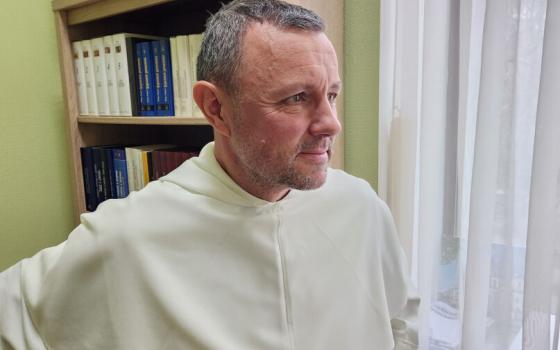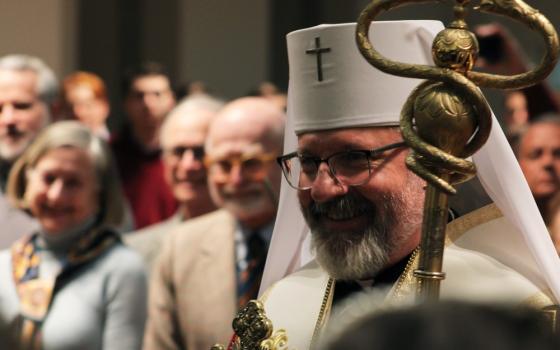My spiritual reading during these traumatic months -- what with wars grinding in Iraq and Afghanistan, the failed Copenhagen Climate Change conference, our being turned away from peacefully entering Gaza, and now the catastrophic earthquake in Haiti--has been a new book from Orbis in their "Modern Spiritual Masters" series: Etty Hillesum: Essential Writings. A balm for my wounds. She speaks to our predicament and points a way forward. She teaches me not just how to cope, but how to grow, deepen, love and serve. I highly recommend this book.
Etty Hillesum was a young Dutch Jewish woman working in Amsterdam during World War II. She kept a series of journals and recorded her spiritual awakening. She saw life in a new light and began serving Jewish refugees in a Nazi transit camp. Finally, she and her family were flung into the great nightmare. The death train transported them to Poland, and in Auschwitz, on November 30, 1943, at the age of 29, she died.
Friends held on the journals for decades, trying unsuccessfully to get them published. Finally, in 1981, they prevailed. The journals were published in Dutch; two years later in English. The world read them for the first time. I read them when they came out, in that version named An Interrupted Life. Her account drew me in -- her struggles, prayers, her growing awareness of God, her gradual peace with death. Her prose is spry and light. It seizes from the famous opening line: "Here goes, then."
This new version excerpts the journals from 1941 to 1943, and adds correspondence that has been since discovered. The introduction, by editor Anne Marie Kidder, brims with insights. Etty, she writes, "is a mystic who, amid the war's horrors, could affirm the goodness and beauty of life and taught herself, as she taught others, to explore the landscape of the soul and the soul's quest for truth and God."
Etty became, in her own astonishing words, "the thinking heart of the barracks."
By a keen eye, Kidder has cataloged the journals' many themes:
- the quest for a knowledge of one's soul,
- the full experience of the present moment,
- prayer as a practice of clearing the pathway to the soul in which God resides and with whom the soul then communes,
- the cultivation of solitude and silence as forms of detaching from external stimuli and dependencies for the sake of finding the source of happiness within,
- the single life as an opportunity for sharing one's love with many,
- a discipline in one's work,
- simplicity of speech and lifestyle,
- humility in acknowledging and admitting one's weaknesses and confessing one's limited understanding of self and others,
- the value of sadness and suffering as a school of patience in the process of becoming aware,
- an ethics of love that governs one's relationship with self and others based on self-knowledge,
- a surrender to one's circumstances and an acceptance of death and the death of the ego,
- or false self, as a way of enlarging upon and enriching life,
- and the cosmic unity of all things in nature where things and creatures are all equally deserving of attention and love.
Etty's transforming journey is a textbook case, Kidder observes.
In the beauty of the smallest pebble, the petals of a flower, the curling branches of a tree, she could detect the entire cosmos, and this discovery made her burst out with the exuberant pronouncement that life was beautiful and God was good. When Etty decided to volunteer working at the Nazi transit camp and insisted on remaining there against the urging of friends…it was from the conviction that she would be carrying her peace and love into the world in order to transform the world, at least to some small degree.
"If you want to teach others how to live," Etty wrote in 1941, "you must first take yourself in hand. You are going to have to go on taking stock of yourself ..."
She's not, however, Pelagian. She was unafraid to submit herself to mystery and grace. "I sometimes feel I am in some blazing purgatory and that I am being forged into something else."
Her transformation unfolds, and she records a slow emergence of astounding inner freedom. From hatred to love, withdrawal to engagement, violence to nonviolence, resentment to forgiveness, feeling hopeless to hope. She could no longer "live with the kind of hatred so many people nowadays force upon themselves against their better nature."
With new inner resources, she learns to take her "quiet room" with her wherever she is, even into the barracks and, one presumes, later to her death. She achieves, she writes, "a state of complete equilibrium," even in the most horrendous moment of Nazi occupation.
I now listen all day long to what is within me, and am able to draw strength from the most deeply hidden sources in myself. I keep following my own inner voice even in the madhouse… Let me perform a thousand daily tasks with love, but let every one spring from a greater central core of devotion and love.
And through devotion and love she discovers detachment. "I know what may lie in wait for us," she writes. "I have already died a thousand deaths in a thousand concentration camps. I know about everything and am no longer appalled by the latest reports. In one way or another I know it all. And yet I find life beautiful and meaningful. From minute to minute."
Life in the madhouse becomes "one great, unpredictable, continuous inner adventure." "I shall evade none of the tempests life has in store for me…. I vow to live my life out there to the full."
And she is not bereft of strength. "Everything we need is within us. But we must know what motives inspire our struggle and we must begin with ourselves, every day anew."
Etty's painful, transforming inner journey to God, love and peace, leads her to accept suffering -- leads her to identify with all those who are suffering. For me, this is the crucial task of the Christian and every spiritual seeker. It is the attitude of the nonviolent Jesus on the cross, where he becomes one with all those who ever suffered in history, with the whole human race. Identifying with sufferers transforms suffering into explosive, disarming, universal nonviolent love.
"Ought we not, from time to time, open ourselves up to cosmic sadness?" she asks.
"I am in Poland every day, on the battlefields. I am with the hungry, with the ill-treated and the dying, every day. But I am also with the jasmine and with that piece of sky beyond my window."
She never felt alone in her sadness and fatigue. Though death hovered like a ghoul, she stared it down and accepted it. She didn't shy from the paradox -- by accepting death, she said, one finds richness and freedom. And in this freedom, she found herself at one with the untold millions who ever suffered over the centuries.
And she found this meaningful. "Meaningful in its meaninglessness." Suffering has been always with us, for her people from the Inquisition to pogroms to war, she explained to herself. It's for us to fit death compassionately into our lives.
And, need it be added, compassion points to the Jewish eschaton of Shalom. "True peace will come when every individual finds peace within himself; when we have all vanquished and transformed our hatred for our fellow human beings of whatever race--even into love one day. It is the only solution." It's our good legacy for generations to come.
Through her ultimate identification with all those who suffer and die, Etty feels an inexplicable -- even scandalous -- love of life. "At night, as I lay in the camp on my plank bed, I was sometimes filled with an infinite tenderness and I prayed, 'Let me be the thinking heart of these barracks.' That is what I want to be. The thinking heart of a whole concentration camp."
Etty's last lines were written on a postcard and thrown from the freight train on her way to Auschwitz . Someone must have picked it up and mailed it to her friend. She wrote: "We left the camp singing ..." Astonishing.
Etty challenges us to make the same determined inner search for God and freedom, and so to identify with all those who suffer in the world, and to reach out with nonviolent love and do what we can for peace and justice, and to do it from that holy inner space of love.
Etty invites us to be the "thinking heart" of the church, in this low moment, the thinking heart of our country, as it moves toward fascism and empire, the thinking heart of the world, as it hangs on the brink of perpetual war, total poverty, nuclear destruction, and climate catastrophe.
Kidder tries to sum up this dear mystic's life:
Mystics are people who begin their quest for wisdom or for God not in the world of externals but in the microcosm of their own soul. There they allow themselves to be fully present to the experiences of a deep-felt joy or sorrow, of beauty or suffering, of gain or loss, so that these opposing poles might in time reconcile and grow and ripen into a harmonious whole. Once this inner harmony has grown from within and wells up as a peace that defies all rational explanation, mystics can carry this inner harmony into the world, thus becoming catalysts in the transformation of the world.
That is the journey before us all.
*****
To contribute to Catholic Relief Services' "Fr. John Dear Haiti Fund," go to: http://donate.crs.org/goto/fatherjohn John's latest book, Daniel Berrigan: Essential Writings (Orbis), along with other recent books, A Persistent Peace and Put Down Your Sword, as well as Patricia Normile's John Dear On Peace, are available from www.amazon.com. For further information, or to schedule a lecture, go to www.johndear.org.



